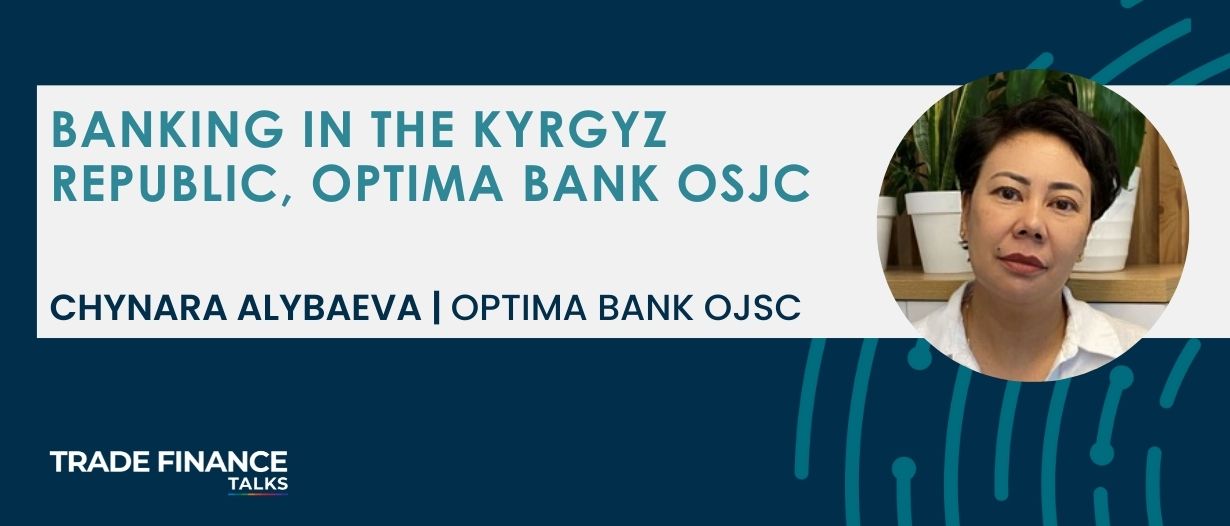The world of trade finance has experienced significant fluctuations as of late. Whether it be the after-effects of COVID-19, the geopolitical climate, or rising inflation rates, the trade industry has seen many changes as a consequence of all these elements.
In preparation for the 2022 EBRD TFP Trade Finance Forum, held in Istanbul, Turkey, Trade Finance Global’s (TFG) Annie Kovacevic sat down with Chynara Alybaeva (CA), head of global transaction banking department at Optima Bank OJSC, to learn more about the banking sector in the Kyrgyz Republic.
Alybaeva’s role spans documentary operations and correspondent relationships, allowing for a comprehensive overview of the banking network on a national level.
Could you expand a little bit more on Optima Bank? Where do you operate?
CA: Optima Bank is a universal commercial bank operating in the Kyrgyz Republic. The bank has recently strengthened its position in the Kyrgyz Republic market, gaining a reputation for garnering reliable partners, and holding both client and shareholder interests in high regard.
The main priority of Optima Bank is high-quality banking services and dynamic development.
Over the last 30 years, Optima Bank has maintained strong foundations as a financial institution (FI), sustaining a sound balance sheet structure, a diversified credit and deposit portfolio, and well-balanced geographical coverage throughout Kyrgyzstan.

Can you give us an overview of the transaction banking landscape in the Kyrgyz Republic? What are the key challenges and risks?
CA: Currently, the main activities of Kyrgyz commercial banks are;
- Increasing the amount of deposits
- Settlement and cash services
- Loans (consumer, mortgage, business development etc.)
- Foreign exchange (FX) transactions
- Cross-border payments
- Documentary operations
Optima Bank’s current strategic trajectory is to ensure free access for the population to banking services, not only in cities but also in rural and isolated areas of the Kyrgyz Republic.
The external environment requires the banking system to be more dynamic. Implementation of the state program and alternate measures to optimise monetary circulation will ensure:
- Increase in the percentage of non-cash payments, reduction of the shadow turnover of cash in the economy,
- Anti-money laundering; legalisation of financial transactions,
- Further development of the legal framework for banking legislation and supervision.
However, a considerable hurdle for the financial development of commercial banks in the Kyrgyz Republic is the current global geopolitical terrain––namely, the Ukraine-Russia conflict.
The economy of the Kyrgyz Republic depends on external financial support, including the Russian market. This new landscape has created an environment where FIs are now especially careful when working with new customers and counter-parties.
Other knock-on effects include; a longer execution period for foreign currency payments due to a decline in international correspondent banking relationships. This has led to an additional layer of tightening requirements for cross-border payments.
What impact has COVID-19 and the current Russia-Ukraine conflict had on banks, more specifically, banks in the Kyrgyz Republic?
CA: One of the main impacts of the coronavirus pandemic on the banking system is the relative deterioration in the quality of loan portfolios.
Whilst a difficult burden to manage, it was not entirely unexpected with quarantine measures and border closures creating derivable negative effects on businesses and on the income of borrowers (legal entities and individuals).
In addition, the turnover of goods and services decreased significantly against the backdrop of a moderate reduction in money transfers and private capital inflows, while increasing payments on obligations.
In 2022, sanctions against Russia led to uncertainty. There were significant after-effects, notably the freezing of Russia’s dollar assets and an increase in energy prices, which ultimately caused strong volatility in the FX markets, including in Kyrgyzstan.
Despite the worldwide negative repercussions of contemporary global economic instability, political risk, and volatility of foreign currencies (the dollar, ruble, euro and tenge), there has been a rapid growth of the banking sector’s profits.
At the end of June 2022, the net profit of commercial banks in Kyrgyzstan increased 4.4 times compared to last year. This increase was attributed to exchange operations with foreign currency, enabling commercial banks to receive most of their income.
How has Optima Bank helped local businesses to gain better access to finance?
CA: The Ministry of Finance of the Kyrgyz Republic disburses concessional loans through commercial banks, including Optima Bank, to support the production industry and the agriculture sector.
We understand that one of the successful indicators of the bank’s activity is a wide client base, which is growing every year, as well as a constantly expanding range of services.
Therefore, Optima Bank conducts regular loan/credit card promotions for its customers. In order to provide additional support to local entrepreneurs, Optima Bank provides deferrals for loan repayments, offering flexible repayment schedule if necessary.

What impact has the cutting of correspondent banking relationships had on Optima Bank’s clearing, access to FX services, and settling of international payments?
CA: Kyrgyz banks hold most of their correspondent accounts with Russian banks, using both the euro and the dollar.
Given the current situation, banks have had to transfer resources from state-owned banks in Russia to private banks, which are not yet under sanctions.
Taking into account long-term cooperation with foreign partner banks, Optima Bank has subsequently developed direct correspondent accounts in Europe and Asia. This allows the bank to provide uninterrupted clearing services to clients in foreign currency.
However, on a more general scale, the situation has been quite complicated. As mentioned previously, there has been a trend of declining international correspondent relationships, with the forecast for Kyrgyz correspondent accounts looking to suffer a similar fate.
The US government has included most of the Commonwealth of Independent States (CIS) in the list of transit countries, through which sanctioned goods may enter Russia.
In case of violation of sanctions, secondary sanctions will follow. Therefore, the Compliance Control Department has tightened vigilance over opening accounts for new customers.
What can multi-laterals such as the EBRD do to support your banking efforts?
CA: Optima Bank is open to mutually-beneficial cooperation with multi-lateral institutions.
The European Bank for Reconstruction and Development (EBRD) is one of the key partners of Optima Bank. Most collaborations fall under the field of lending, co-financing, and trade finance.
Optima Bank is also a participant of the EBRD’s KyRSEFF program––a program backed by the EBRD seeking to finance sustainable energy in Kyrgyzstan.
The Russian Kyrgyz Development Fund (RKDF) provides financing for those projects. Aside from the commercial benefits for the owners, this initiative will have a positive impact on the overall economy, creating more jobs, increasing tax payments, improving imports and exports, and positively impacting the development of local communities.
Particular emphasis has been given to the projects aimed at propelling rational use of resources and energy, waste reduction, processing, regeneration of resources, and using environmentally friendly technologies.
With half of the micro-finance sector’s credit sources coming from international donors, how can we be sure to support SMEs in this current economic climate?
CA: Small and medium-sized businesses (SMEs) are a powerful factor in the country’s economic development. They occupy about 60% of the client base of banks and, accordingly, the banks are interested in financing such clients as they are highly profitable.
The main priority areas for SMEs in the Kyrgyz Republic are agriculture, industry, trade, car repair, hotels and restaurants, transport and communications, financial activities, real estate transactions, education, healthcare, alongside social and personal services.
Kyrgyzstan is a member of more than 70 international organisations. These international organisations also support and finance SMEs in Kyrgyzstan and play an important role in the development of SMEs in the state.

What steps have been taken to introduce green finance or green financial products?
CA: Optima bank always supports the loans with a “green clause” placing them as a priority. With the support of EBRD (KyRSEFF program) and RKDF, Optima Bank implements energy and heat saving projects in apartments/houses, lighting and sewerage improvement systems in hotels, planting of trees, and the modernisation of excised hydro-electric power plants.
One notable example is the tree-planting project in the Issyk-Kul region, amounting to the planting of 17 thousand Paulownia trees.
Paulownia trees are famous for their fast growth; an added bonus comes in the form of their leaves, as they can be used as animal feed.
Reaching a maximum height of 15-17 metres, this tree lives up to 70 years. Paulownia also processes ten times more carbon dioxide than any other tree and therefore releases more oxygen.
Paulownia’s wood is valued all over the world for its durability and lightweight.
What does the future of transaction banking look like in the Kyrgyz Republic?
CA: A few years ago, it seemed impossible for us to pay for purchases by attaching a smartphone to the terminal. COVID-19 and quarantine measures have undoubtedly accelerated digitalisation.
The new digital reality and highly competitive environment are forcing banks to move to the client side. It has increased user accessibility, allowing clients to choose the most convenient bank with the best online banking platform without much effort.
The digitalisation of banking services will optimise processes and facilitate the access of the population to banking services, including those regions in the country where banking penetration is insufficient.
It will additionally provide an opportunity to increase online operations, as well as simplify access to banking services and develop distance sales channels.
Therefore, along with the development of digitalisation of banking services, commercial banks need to modernise their automated banking systems in accordance with the requirements of international standards.




























